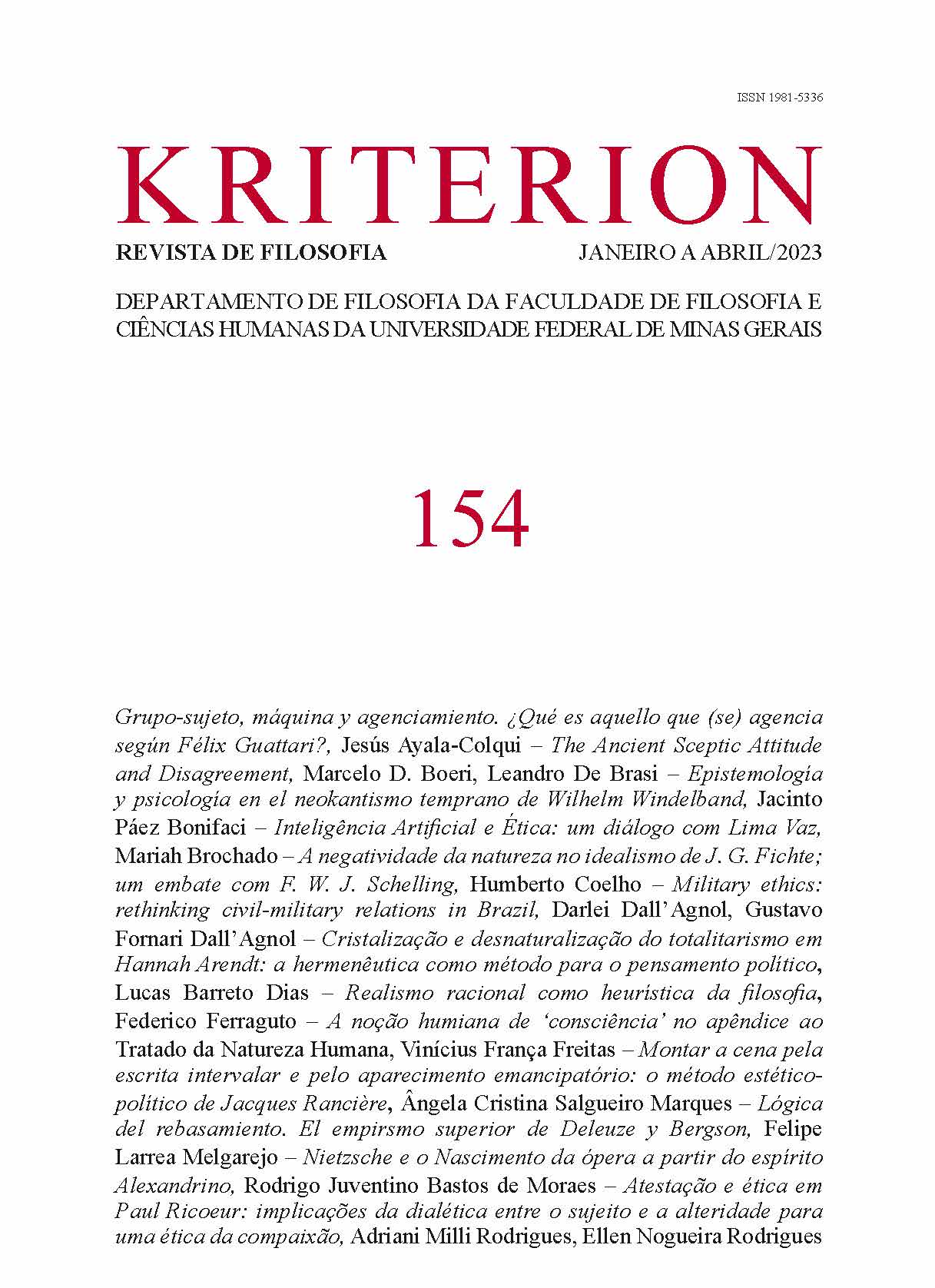NIETZSCHE AND THE BIRTH OF THE OPERA FROM THE ALEXANDRINE SPIRIT
Keywords:
Nietzsche, Lindner, Opera, Tragedy, AlexandrianAbstract
The article intends to present the origin of the opera, in the thought of the young Nietzsche, parallel in the birth of the ancient Greek tragedy with whose comparison we intend to show how the formation of the first takes place under the insignia of an instinctual restriction. The idea is to present the origin of opera, as Nietzsche understood it from the reading of Zur Tonkunst by Ernst Lindner, as a critique of the western rationalization process that imprisoned the productive force of Nature as of the superposition of consciousness to the unconscious force of art. Even in the case of a dramatic genre that uses music, a form of expression that in theory expresses the very Idea of the world.
Downloads
References
ARALDI, C. “O simbolismo das criações apolíneas e dionisíacas: uma análise crítica da estética do jovem Nietzsche”. Reflexão, Campinas, 34 (96), jul./dez, 2009.
GOETHE, J.W., SCHILLER, F. “Briefwechsel zwischen Schiller und Goethe”. Stuttgart: J.G. Cotta, 1881. Vol. 1.
GUIDO, A. A. “Sobre a estética kantiana do belo e do sublime”. In: Ensaios de filosofia em homenagem a Carlos Alberto R. de Moura (org. D. Morato Pinto, L. Moutinho, M. Sacrini, Monica Sival). Curitiba: UFPR, 2015.
KANT, I. “Crítica da Faculdade do Juízo”. Trad. V. Rohden e A. Marques. Rio de Janeiro: Forense Universitária, 2010.
LINDNER, E. O. “Zur Tonkunst”. Berlin: I. Guttentag, 1864.
MORAES, R. “Uma cultura para Shakespeare e Beethoven”. Cadernos Nietzsche, Guarulhos/Porto Seguro, Vol. 42, Nr. 3, pp. 45-67, setembro/dezembro 2021.
NIETZSCHE, F. “Sämtliche Werke. Kritische Studienausgabe”. Editores: G. Colli e M. Montinari, Berlin/New York: Walter de Gruyter, 1988.
________. “O Nascimento da Tragédia”. Trad. J. Guinsburg. São Paulo: Cia das Letras, 1999.
________. “O drama musical grego”. In: A visão dionisíaca do mundo. Trad. e org. Marco S. P. Fernandes & Maria C. S. Souza. São Paulo: Martins Fontes, 2010.
________. “Introdução à tragédia de Sófocles”. Trad. Marcos Sinésio P. Fernandes, São Paulo: Martins Fontes, 2006.
________. “Introdução ao estudo dos diálogos de Platão”. Trad. Marcos Sinésio P. Fernandes. São Paulo: Martins Fontes, 2020.
________. “Música e Palavra (Fragmento Póstumo Nr. 12[1], da primavera de 187”. In: Discurso, Nr. 37. Trad. O. Giacoia Jr., 2007.
________. “Sócrates e a Tragédia”. In: A visão dionisíaca do mundo, op. cit.
SCHILLER, F. “A noiva de Messina”. Trad. M. Suzuki. São Paulo: Sesi-SP Editora, 2018.
SCHLEGEL, F. “Sobre o estudo da poesia grega”. Trad. C. L. Medeiros. São Paulo: Iluminuras, 2018.
SCHOPENHAUER, A. “O mundo como Vontade e Representação”. Trad. J. Barboza. São Paulo: Ed. UNESP, 2005. Vol. 1.
SCHOPENHAUER, A. “O mundo como Vontade e Representação”. Trad. J. Barboza. São Paulo: Ed. UNESP, 2015. Vol. 2.
TOMLINSON, G. “Metaphysical Song: An Essay on Opera”. New Jersey: Princeton University Press, 1999.
TORRES FILHO, R. “O simbólico em Schelling”. In: Ensaios de filosofia ilustrada. São Paulo: Iluminuras, 2004.
WAGNER, R. “Beethoven”. Trad. A. Hartmann. Rio de Janeiro: Zahar, 2010.
________. “Quatre poèmes d’opéras”. Trad. R. Wagner. Paris: Librairie Nouvelle, 1861.
WILSON, J. E. “Schelling und Nietzsche (Zur Auslegung Der Frühen Werke Friedrich Nietzsches)”. Berlin/New York: W. de Gruyter, 1996.
Downloads
Published
How to Cite
Issue
Section
License
Copyright (c) 2023 Revista Kriterion

This work is licensed under a Creative Commons Attribution 4.0 International License.










